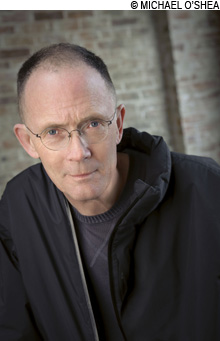William Gibson's randomized experience
By MATT PARISH | January 4, 2012

“Any version of history that somebody can explain to you over the course of two beers is a conspiracy theory.” |
William Gibson — the writer who famously coined the term "cyberpunk" and whose classic tech-punk novels like Neuromancer and The Difference Engine helped spawn a couple generations' worth of bleak, busted fantasies — is now on tour promoting his first collection of nonfiction. Comprising essays, articles, and speeches from the last 30 years, Distrust That Particular Flavor surveys Gibson's real-life inquiries into far-flung locales (his critical piece on Singapore got Wired magazine banned there in the '90s) and Internet trends like eBay. I spoke with him recently over the phone from his home in Vancouver about everything from the challenge of non-fiction, the Internet as a tool in social change, the disappearance of the future from our imaginations, and last year's Stanley Cup riots.I have memories of seeing some of this in original format and your careful, inquisitive tone still holds up — what do you think? I'm glad — as you can probably tell from the introduction, I wasn't too sure about the project initially. Prior to that, I was scared to go back and look at all that stuff because I was afraid I wouldn't think much of it. And it's not like I fell in love with it, but I came to terms with it. I can see that it's where I'm from.
With a lot of your commentary throughout the book, there's sort of an apologetic tone about it, like you're pulling out old embarrassing clothes from a trunk. I guess so. I mean, to me it would be even creepier if you were pulling the clothes out of the trunk and going, "Damn, this was hot!" That would worry me more. I think the correct response to one's earlier work is a kind of guarded sort of, "It's . . . okay. That's sort of okay." Otherwise, I'd be totally into myself, which is something that writers can famously do. It's something I've always thought to watch out for.
When you were first getting involved in this kind of writing, were you seeking out assignments like this or were magazines seeking you out? I didn't do anything actually. It's funny because it was kind of an inadvertent career. I didn't have business cards made or network at all. I think probably Rolling Stone was the first real magazine to ask me to do anything, and that brought me to the attention of other magazines. Then Wired magazine, back in the pre-Conde Nast crazy period, really got it going. They were quite successful, so they could afford to do crazy things. They'd call me up and say, "Where would you like to go?" [Laughs.]. I'd say, "Okay. How about Singapore?" That was very interesting that way. I think they sent Neil Stephenson completely around the world following some Internet cable. Like, physically, from continent to continent. You should see the pieces about it. It was a very interesting that way.
 Related
Related:
The realist’s guide to experimental fiction, Michael Chabon feels the flow, Life as a commercial: John Kenney's Truth in Advertising, More 
- The realist’s guide to experimental fiction
Ten years ago, I bought a copy of Ben Marcus's first novel, Notable American Women, on the recommendation of a young literary editor.
- Michael Chabon feels the flow
Michael Chabon has a thing for pop culture.
- Life as a commercial: John Kenney's Truth in Advertising
Gwyneth Paltrow, 1984 , and dirty diapers aren't an obvious mix.
- Lawless Youth: Chanel Bonfire by Wendy Lawless
Adolescence is tough on everyone. But imagine the growing pains that come along with a drunken mother who uses an ax to chop down your sister's bedroom door.
- Scary monsters and super freaks
What if deceased presidents were reincarnated as horses in a belated lesson in humility?
- Sweet bad dreams: Yoko Ogawa's latest book
What lingers like a nightmare?
- Talking to Sherman Alexie
The people who made Spokane Indian writer Sherman Alexie's semi-autobiographical The Absolutely True Diary of a Part-Time Indian the second-most censored book of 2010 didn't realize they were doing him a favor, he told us.
- Review: Dylan Jones's 'Biographical Dictionary of Popular Music'
In the modern world of Wiki and the Interweb, if you're going to produce an actual print-edition dictionary of pop music, you'd better frontload it with attitude.
- It's in the cards: Karen Engelmann's new book
Historical fiction is a perfect winter indulgence.
- Errol Morris: The truth, the whole truth, nothing but the truth
August 29, 1979. Dr. Jeffrey MacDonald, a former Army Special Forces Captain, was convicted of the savage murders of his wife and two daughters as they slept in their house within Fort Bragg, North Carolina.
- Brilliant friends: Great reads of 2012
You already know Chis Ware's Building Stories is the achievement of the decade (thanks, New York Times!), but some other people wrote some pretty great books this year too.
- Less

 Topics
Topics:
Books
, Books, William Gibson, authors, More  , Books, William Gibson, authors, arts features, Less
, Books, William Gibson, authors, arts features, Less 